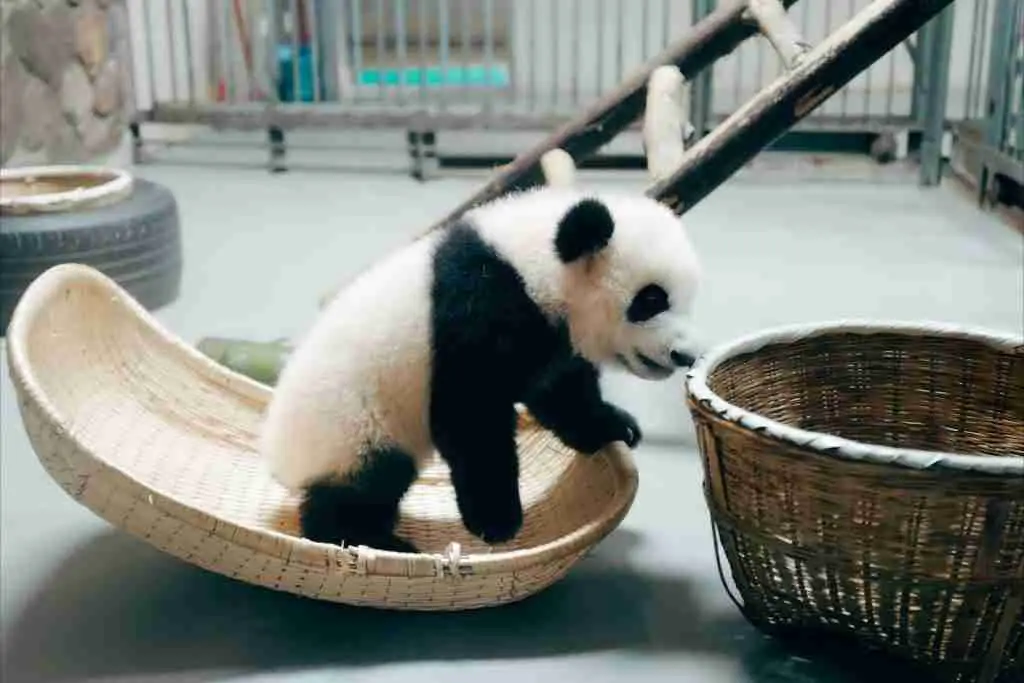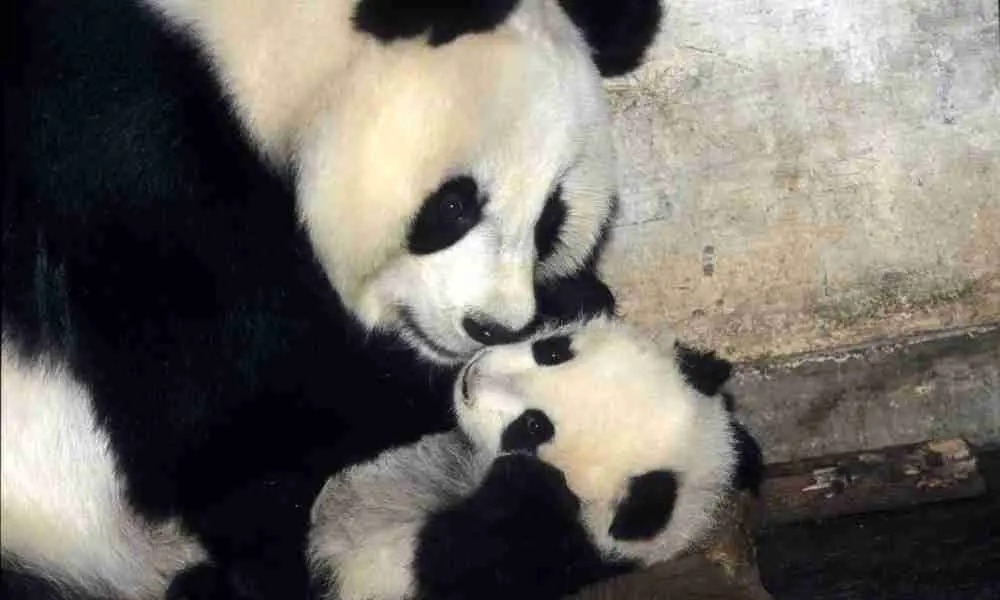Did you know that some people consider giant pandas as bad parents?
Of course, it sounds unbelievable, but there is evidence that supports this claim!
In this article, I will discuss both the good and the bad of pandas’ parental care.
Let’s read more below!
2 Reasons Why Pandas Are Bad Parents
While there can be many reasons why mother pandas lack certain parenting skills, here are the most common ones:
1. Pandas Abandon Their Babies
Most of the time, the mother panda prefers to take care of the stronger baby. In other words, the weak cub is often abandoned in the panda “kingdom.”
Although female pandas can give birth to multiple babies, twins are the most common among them. At birth, the panda cubs are usually tiny, blind, weak, and, hence, helpless.
Taking care of two babies at once can be a huge task for the mother panda.
Bear in mind that the pandas feed primarily on bamboo, which contains few nutrients.
Unfortunately, the panda doesn’t produce enough milk to care for two babies at once. Besides, there’s not enough energy to cater to two blind, helpless cubs.
Did you know?
On average, it takes about 8 to 9 months before a baby panda can become less dependent on its mother. There’s a high chance that both cubs will not receive the same amount of care over that long period.
As much as the mother will love to care for her babies, she also needs to survive. So the mother panda observes the two babies over a short period.
When one baby is growing faster than the other, the panda focuses her attention on it. On the contrary, the “weaker” cub suffers from neglect and dies eventually.
2. They Can Be Careless With Their Cubs

Sometimes, the mothers endanger the lives of their cubs unknowingly. It’s one thing to care for a strong baby, and it’s another to ensure the baby’s survival.
Naturally, pandas have a clumsy nature. While walking clumsily in their habitat, the mother panda can accidentally crush her baby.
In some cases, the panda can roll over her cub when sleeping, thereby killing it in the process.
Being extremely tiny also increases the panda cubs’ chances of being crushed to death.
At this point, it is important to note that a newborn baby panda can weigh around 100 grams (4 ounces). On the other hand, mother pandas can weigh about 200 lbs.
So it’s not surprising that the panda can sometimes roll over and crush her cub.
Situations like this can be distressing for the mother panda because it wasn’t intentional. This is one of the reasons it is important to provide a large habitat for the pandas, especially in captivity.
3 Reasons Why Pandas Are Also Good Parents
Despite being bad in certain areas, pandas also display some good parenting skills. Take a look at these 3 reasons why pandas make excellent parents.
1. Pandas Build A New Habitat Before Delivery
Can you believe that the pregnant panda is a good builder? When the delivery day draws near, the panda begins to construct a den in a tree stump or hollow tree.
In the wild, the expectant giant panda searches for tree branches, moss, and leaves to line the den. Doing this allows the babies to become comfortable in their habitat.
Sometimes, the panda builds more than one den for safety purposes. So in a situation where there’s a predator around, it will be easy to move to another den.
2. Pandas Give Proper Attention To Their Young
For about 9 months or more, the mother panda gives complete care and attention to her cubs. And it takes about two years for the young pandas to leave the den on their own.
As we’ve mentioned earlier, baby pandas are usually helpless at birth. As a result, these cubs are always completely dependent on their mother for everything.
During the first 2 months after birth, the female carries the cub in her paws for safety.
Besides, the panda mom rarely leaves the den unless she is hungry or thirsty. She spends the major part of her day feeding and protecting her young until they become mature.
As you can see, taking care of baby pandas is like a “full-time job” for panda moms.
3. They Teach Their Cubs How To Survive

When the panda babies are with their mothers, they learn how to survive.
In their natural habitat, it is easier to come across predators. Young pandas can be constantly attacked or killed if they are not vigilant.
So, the panda mom must teach her cub how to climb trees or appear threatening.
Moreover, the mother panda also teaches her young ones to look for food by themselves. All these ensure they live a longer, healthier life.
RELATED QUESTIONS:
How Do Humans Help Pandas To Become Good Parents?
While in captivity, the zookeepers always try to ensure the survival of the panda cubs. Hence, they have to switch each baby between the mother panda and the incubator for feeding purposes.
This gives the panda the assumption that she is taking care of just one cub. In a day, the keepers can do this up to 10 times or more just to keep both babies safe.
However, it takes time and close monitoring before the keepers can take this action. Like all mothers, the panda wouldn’t want to give up her child easily.
To gain her trust, the zookeepers constantly pass food to the panda. Over time, the mother panda let her guard down, giving the keepers the chance to switch her cubs.
Although this method can be challenging, it has contributed to the survival of many panda cubs in captivity.
Why Do Pandas Kill Their Babies?
Pandas do not kill their babies on purpose. This only happens as a result of neglect or a lack of care from the mother panda.
If a panda gives birth to twins, she’ll prefer to focus her attention on the stronger one. Due to their bamboo diet’s little nutrition, it’s not easy for pandas to care for two babies at a time.
Aside from insufficient milk production, the female panda doesn’t have the strength to care for twin cubs. She’ll have to ignore the weaker baby, which always leads to its death.
Do Pandas Crush Their Babies?
Yes, pandas crush their babies even though it happens accidentally. Two major factors that contribute to this occurrence are the cubs’ small size and the pandas’ clumsy nature.
At birth, a baby panda is usually about 1/900th its mother’s size. And pandas are generally known to be clumsy animals.
In a small enclosure, it is easy for the mother panda to roll over and crush her baby while sleeping. Furthermore, the panda mother may accidentally step on her cub while walking.
Final Thoughts
For certain reasons, pandas are usually considered bad parents. Not only do they abandon their babies, but they can also be careless with them.
Regardless, female giant pandas have some good characteristics. In addition to providing proper care for their young, they also train them to survive.
That’s not all, expectant pandas build a new den for their babies before the day of delivery.
Therefore, keep in mind that even though pandas are not perfect, they’re not completely terrible parents.
Do you want to learn more about baby pandas? Check out this article – All About Panda Cubs

